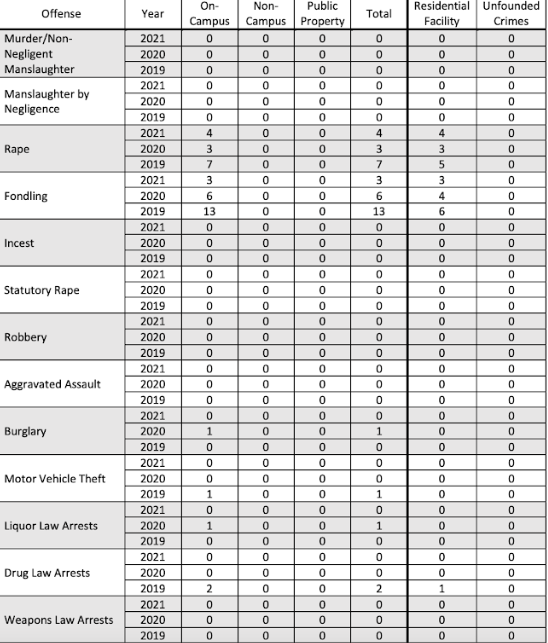Every year, Carleton College is required to complete the Clery Report, the annual security and fire safety report, in compliance with the Jeanne Clery Disclosure of Campus Security Policy and Campus Crime Statistics Act. The report covers safety and security policies, emergency procedures, fire safety policies and statistics as well as crime statistics of the previous calendar year. On September 30, the report covering the 2021 calendar year was published.
The report identifies examples of campus security authorities, including professional staff in both the Dean of Students office and the Student Activities office, Resident Assistants (RAs), athletic directors and contract security officers. Other campus members including the chaplain, counselors and faculty and staff outside of student organizations would not meet the requirements for being campus security authorities. However, the school maintains the college chaplain and Student Health and Counseling (SHAC) as the two confidential reporting resources.
Current crime prevention programs in place include having a safety escort, emergency telephones, crime prevention presentations, bicycle locks available at the college bookstore, the whistle-alert program, free web camera covers and printed crime prevention materials.
This year’s statistics showed 36 liquor law violations that were referred for disciplinary action as well as 12 drug law violations that were referred for disciplinary action. Liquor law violations increased slightly, from 34 in 2020, but remain significantly lower than the 2019 statistic of 52 violations. Drug law violations had a large drop from 27 in 2019 and 17 in 2020. There were zero reports of murder, manslaughter by negligence, incest, statutory rape, robbery, aggravated assault, burglary, motor vehicle theft, liquor, drug or weapons law arrests, arson, domestic violence, dating violence or stalking. The college also reported zero hate crimes in the past year.

Looking at sexual violence data, it is important to note that the Clery Report defines sexual assault as “any sexual act directed against another person, forcibly and/or against that person’s will; or not forcibly or against the person’s will where the victim is incapable of giving consent.” “Incapacitation” could be due to drugs, alcohol or being unconscious, among other things. Rape is defined as “penetration, no matter how slight, of the vagina or anus with any body part or object, or oral penetration by a sex organ of another person, without the consent of the victim.” The college reported four accounts of rape in 2021, one higher than in 2020, but three lower than in 2019.
Further, there were three accounts of fondling, a decrease from 13 in 2019 and six in 2020. The report defines fondling as “the touching of the private parts of another person for the purpose of sexual gratification, without the consent of the victim, including instances where the victim is incapable of giving consent because of his/her age because of his/her temporary or permanent mental incapacity.”
The Clery Report requires that the school report any sexual violence that occurs in the context of a school’s education programs and activities, including academic, educational, extracurricular and athletic programs. Incidents of sexual assault that are connected to these activities must be reported even if they occur off campus. It is for this reason that statistics may vary among different reports.
The report also includes fire safety statistics with there having been two fires in 2021, one in Colwell House with the cause of “unintentional/cooking” and a second in Evans Hall due to the cause of “unintentional/smoking materials.” Neither of these fires led to any injuries nor did they have a property damage value of over $100.
Reporting procedures remain the same, and campus community members are encouraged to “promptly and accurately report criminal or suspicious activity to Security Services either in person or by dialling extension 4444 from a campus telephone or 507-222-4444 from a cell phone or outside line.”











